Roue ar Romani
Le Roi de Romanie - The King of Romany
Texte recueilli par François-Marie Luzel:
auprès de Jeanne Le Rolland, de Pluzunet, en 1867Publié dans "Gwerzioù Breizh-Izel, tome I", page 178, en 1867
Classification Malrieu: M-00150

St Christophe, St Loup, Charon, St Bernardin, Nessus et Déjanire, St Gilles,
Mélodie
"Le marié enragé"
Collecté Par l'Abbé Cradoux, recteur de Croixanvec en juillet - août 1926.
Mélodie publiée par l'Abbé François Cadic,
dans la "Paroisse bretonne de Paris", en juillet août 1925.
Utilisée ici à titre d'illustration sonore.
Arrangement par Christian Souchon (c) 2012
|
ROUE AR ROMANI Gwez kentañ I 1. P'oa roue 'r Romani 'pourmen, Hag hen 'welet ur goulmik wenn ; Ur goulmik wenn dimeuz ann ef, 'Gomzaz out-han a beurz Doue. 2. - Roue 'r Romani, kuita da di, Ha kerz da chomm d'ann Normandi ; Red 'vo did kuitad d' rouantelez, Kent wit antren er gristenez ! - 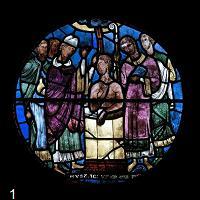 3. Roue 'r Romani p'hen euz klewet, D'he bried paour hen euz laret : - Gret-c'hui er-vad d'hon bugale, Me a ia brema da vale. - 4. - Mar et, m' fried, me iel' iwe ; Petra 'vo gret d'hon bugale ? - - C'hui dougo unann ha me daou. Pa veomp skuiz, ni ziskuizo : 5. Pa veomp skuiz, ni ziskuizo, Ann amzer bepred 'dremeno ; Ann amzer bepred 'dremeno, Hag hon buhe a divezro. - [1] II 6. Kement ho deuz gret o kerzet, M'int gant ur chapel arruet ; Bars ar chapel p'int antreet, War ho daoulinn int em strinket 7. Hag hi 'welet viziblamant Korf Jezuz 'n ur c'haliz arc'hant ; Korf Jezuz 'n ur c'haliz ardhant, 'Wit reï d'he ho femp 'r vadeziant. 8. P'ho deuz 'r vadeziant resevet, Gant ho hent adarre 'z int et ; Gant ho hent adarre 'z int et, En bord ar mor 'z int arruet. 9. En bord ar mor p'int arruet, Saludi 'r pasajer 'deuz gret : - Pasajer paour, mar am c'haret, Tremenet anomp 'n ur vaged. - 10. - Roët d'in dorn 'nn dimezel-ze, Ha me hi c'hasso d'ar c'hoste. - - N'omp ket kement 'n ur vandennad, Na iefomp pemp en ur vagad. - 11. - Roët d'in dorn 'nn dimezel-ze, Me deuio d'ho kerc'had goude. - N'oa ket 'n anter ar mor rentet, Afront d'ez-hi hen euz bet gret. 12. - Itron Varia ann Drindet ! Preservet ann-on d'am friet; Preservet ann-on d'am friet, Biskoas ar sonj-se n'am euz bet ! - 13. N'oa ket hi gir peurlavaret, 'R c'hurun ann ef 'zo diskennet ; 'R c'hurun ann ef 'zo diskennet Hag ar vag 'zo daou-anteret ! 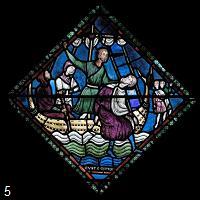 14. Ar vag a zo daou-anteret, Hag ar pasajer 'zo beuzet ; Ar pasajer a zo beuzet, 'R rouanes d'ar c'hoste kasset : 15. - Itron Varia ann Drindet, Setu me ama dilezet ; Dilezet pried, bugale, Birwikenn n' welann ann ez-he ! - III 16. Rouanes Romani 'lare, En hostaliri p'arrue : - Roët d'in-me boed ha dillad, Me chomo 'n ho ti d' labourad ; 17. Me chomo d' labourad 'n ho ti, 'Reï dantelez hag aouraji..... . . . . . . . . . . . . . . . . . . . . . . . . . . . . . . . . IV 18. Roue 'r Romani a lare D'he vugaligou en eur-ze : - It war ma c'houk, ma mab-henan, 'Tre ma diou-vreac'h m' mab bihannan ; 19. M' mab entre-henan, chomet aze, Me deuio d'ho kerc'had goude... - Na pa oa o tremen ar mor, 'Koezaz he vab-henan en dour. 20. P'arruaz gant h' vab entre-henan, A oa ul leon hen tagan ; P'arruaz gant h' vab iaouanka, 'Oa ur bleiz-mor hen ziframma ! 21. Roue 'r Romani a lare En bord ar mor, en he goanze : - Itron Varia ar Folgoet, [2] Setu me ama dilezet ; 22. Kollet pried ha bugale, Birwikenn na welann ann-he ! Birwikenn' na welann ann-he, Ha petra breman a rinn-me -? - V 23. Roue 'r Romani a lare, En ti 'r pinvidik p' arrue : - En hano Doue, un tamm boed, Tri dewez 'zo tamm n'am euz bet ! 24. Penamet eo braz graz-Doue, N'ouzonn penaoz 'haljenn bale ; Roët d'in-me boed ha dillad M' chomo 'n ho ti da labourad ; 25. Me chomo d' labourad 'n ho ti, 'Reï dantelez hag aouraji..... - . . . . . . . . . . . . . . . . . . . . . . . . . . . . . . . . 26. Kriz 'vije 'r galon n' oelje ket 'Welet 'r roue 'vessa ann denved, En he zorn un tamm bara loued, Chass 'r pinvidik n'hen debrjent ket ! 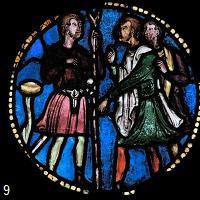 VI 27. Pastor ar roue 'vonjoure Roue 'r Romani, p'hen gwele : - Pastor ann denved, d'in laret, N'oc'h euz gwelet roue a-bed ? - 28. - Me zo seiz bloaz-so gant 'nn denved-man, N' 'm euz gwelet roue-bed 'tremenn aman. - - C'hui 'zo roue ma vis-a-vis, M'ho anvez euz ho fourdeliz. 29. Kassomp d' 'r pinvidik he denved, Hennes a hallo lavaret Penaoz he denved a zo bet Gant ur roue braz diwallet ! - VII 30. Roue 'r Romani 'vonjoure En hostaliri p' arrue : Hotises, d'in-me lavaret, Moïenn a vo da vout lojet ? 31. Moïenn 'c'h euz d' lojan ur roue, Hag he bastor kerkoulz hag hen, Ur plac'hik koant d'ho serviji, N'am euz gwelet biskoas hini 32. Hag a vije ker koant ha hi, Met rouanes ar Romani. - Oh ! ia sur, deuet bars ann ti, Moïenn 'walc'h 'zo d'ho serviji... 33. Ma flac'h-ar-gambr, mar am c'haret, Da zerviji ann daol 'teufet ; Seiz bloaz 'zo ez oc'h 'bars ma zi N'ho 'm euz ket pedet d' serviji ; 34. C'hoas n'am bije ket ho pedet, Penamet 'zo 'r roue arruet.....- . . . . . . . . . . . . . . . . . . . . . . . . . . . . . . . . VIII 35. - Plac'hik iaouank, d'in-me laret, Un tamm euz ma flat a' zebrfet ? - Pa eaz d' gommer un tamm er plad, Hi gwalenn aour hen euz gwelet : 36. - Itron Varia ann Drindet, A posubl ve 'vec'h ma fried ! - - Mar oc'h roue, 'vel ma laret, Hon bugale pelec'h int et ? - 37. - Pa oann o tremenn ar mor-braz, Ma mab-henan en dour 'goezaz ; P'arruaz d' vouit m' mab entre-henan, 'Oa ul leon euz hen tagan ; 38. Arru gant ma mab iaouankan, 'Oa ur bleiz euz hen ziframma ! - N'oa ket ar gir peurlavaret, Ar rouanes d'ann douar 'zo koet ; 39. Ar rouanes d'ann douar 'zo koet, Paj ar roue 'n euz hi zavet ; Pal ar roue 'n euz hi zavet, Hi zri mab 'r gambr 'zo arruet. 40. - Ma bugale, d'in lavaret, Ha piou hen euz ho mailluret ? - - A-fonz ar mor un dimezell-wenn A deue bemde d'hon kelenn ; 41. A deue bemde d'hon kelenn, Da ziluia hon bleo-melenn..... - . . . . . . . . . . . . . . . . . . . . . . . . . . . . . . . . IX 42. Ann aotro sant Loup ha sant Gili, Ar mab iaouank sant Bernardi, 'Zo tri mab roue 'r Romani, 'Zo et da chomm d'ann Normandi. [4] [5] Kanet gant Janet Ar Rolland e Pluzet, 1867 |
ROUE AR MANI Eil Gwez [3] I 1. Disul da noz, goude ma c'hoan, 'Z on em wisket, wit partian: 'Tont ul luc'hedenn uz d'am fenn, Ken 'sklezrie tro-dro ann dachenn! 2. - Roue 'r Mani, poent eo monet D'glask badeziant d'ho inosanted; D'glask badeziant d'ho inosanted Did da unann ha d'as pried ! - 3. Roue ar Mani a lare Er ger d'he bried, p'arrue : - Ma fried, me ia da vale, Pa vin me bet, c'hui iel' iwe. - 4. - Mar et, ma fried, da vale, Me a ielo ganec'h iwe. - - Mar eomp da vale hon daou, Pelec'h iel' hon bugaligou ? - 5. - Chui 'zougo unan, ha me daou, Doue hag 'r Werc'hes hon zikourou..... - Doue hag 'r Werc'hes deuz ho zikouret, Ann hent-mad ho deuz kommerret. II 6. 'Tal ur chapel int arruet, Badeziant ho deuz goulennet. 'Nn aotro sant Iann 'n euz ho badezet, Doue hag 'r Werc'hes deuz ho dalc'het. 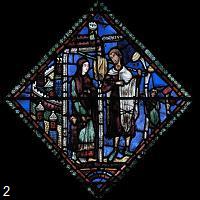
9. Ann hent-mad ho deuz kommerret, 'Tal ar mor-braz int arruet ; 'Tal ar mor-braz int arruet, Ha goulenn tremenn ho deuz gret. 9 bis. - Tremener, lares-te d'in-me Te hon zremenfe d' vont d'ar c'hoste ? M'am zremenes, ma zremenn kouit, N' 'm euz ket a 'vado da rei did. 10. Me 'zo deut aman a bell bro, Am euz roët ma holl vado. - - Deut d'in krog en dorn ar vroeg-ze, M'hi zremeno d' vont d'ar c'hoste. - 11. Anter 'r pasaj p'eo arruet Drouk-ober d'ez-hi 'n euz c'hoantet ; 'R vag war hi geno 'zo troët Hag ann tremener 'zo beuzet !..... III (a) Ar vroegik koant a c'houlenne, 'N ti ar pinvidik p'arrue : - En han' Doue, un tam bara, Tri de 'zo na zebriz netra ! (b) Ma miret 'n ho ti d' labourat, Pinvidik m'ho servijo mad ; Me a reï skool d'ho pugale, Ho disko d' serviji Doue,  (c) Koulz hag am bije gret d'am re, Siouas ! ma oann chommet gant-he. - - Et duze d'ann hostaliri, Eno 'kavfet da serviji. - 16. Ar vroegik paour a c'houlenne, 'N tal 'n hostaliri p'arrue : - Ma miret 'n ho ti d' labourat, Hostises m'ho servljo mad ; 17. Me a reï skool d'ho pugale, Evel am bije gret d'am re ; Evel am bije gret d'am re, Ma vijenn bet chommet gant-he. - 17 bis. - Deuet en ti hag azeet. Ken vo klewet gant ma fried ; Ken vo klewet gant ma fried, Rag laret d'ac'h na hallann ket.. ... - IV 23. Roue ar Mani a lare, En ti 'r pinvidik p'arrue : - En han' Doue un tamm bara, Pell-braz 'zo na zebris netra ! 24. Ma miret 'n ho ti d' labourat, Pinvidik, m'ho servijo mad..... - Roët tranch d'ez-han , d' dorri havrek, Met allas ! n'ouïe mann a-bed ! 26. Roët 'zo d'ezhan 'n tamm bara-loued, Da vont d'al lann gant ann denved..... Bet eo seiz vloaz 'l lann gant ann denved, Gant un tammik kreun bara-loued. 27. Pa oa ar seiz bloaz achuet, Baroned el lann 'zo arruet : - Na mesaër, lares-te d'in, Na t'euz gwelet roue 'r Mani ? 28. - M'eo roue ar Mani 'glasket, Me gred eo out-han a komzet : Me 'zo seiz bloaz 'zo gant 'nn denved, Gant un tammik kreun bara-loued. 29. Kasset d' 'r pinvidik he zenved Hag he dammik kreun bara-loued..... - Ar baron-man a c'houlenne, 'N tal 'nn hostaliri p'arrue : 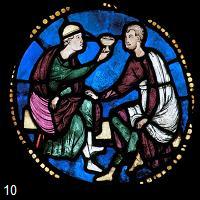 30. Beza 'zo 'n hostaliri-ma D'am baroned ha me d'goania ; D'am baroned ha me d'goania, Ur plac'hik koant d'hon servija ? - 33. - Ur plac'h 'zo seiz bloaz-so em zi, Biskoas n' deuz servijet hini ; Biskoas hini n' deuz servijet, Me garr 'nn ez-hi dreist ma merc'hed. - 34. Mar koaniomp fenoz en ho ti 'Teuï 'r plac'hik koant d'hon serviji ; 'Teuï 'r plac'hik koant d'hon serviji, N 'hon euz drouk-bed d'ober d'ez-hi. - 35. Na pa oa ar goan preparet, Plajou war ann daol digasset : - Plac'hik iaouank, laret-c'hui d'in, C'hui debrfe 'n tamm er plad ganin ? - 36. - Itron Varia ann Drindet, Petra 've kaoz na rafenn ket ? Petra 've kaoz na rafenn ket, Alies, 'kredann, am euz gret ! ..... Kanet gant Marianna An Noan, paourez-koz, paroz Duault |
LE ROI DE ROMANIE Première version I 1. Au cours d'une promenade Du Ciel vint en ambassade Au bon roi de Romanie Une colombe jolie: 2. - Va-t-en, roi de Romanie, Va-t-en vivre en Normandie! Cette terre n'est plus tienne. Va donc en terre chrétienne! 3. "Soucieux de notre ménage, Femme, durant mon voyage, Nos enfants je vous confie." Dit le roi de Romanie 4. - Vous me laisserez, j'espère - Mais nos trois enfants qu'en faire? - Mettre mes pas dans les vôtres. - Portez-en un, moi les autres. 5. En chemin faisons des pauses Quand la fatigue l'impose. Le temps passera, patience, Rognant sur nos existences! - [1] II 6. Longtemps, longtemps ils marchèrent. Ils virent un sanctuaire. A l'intérieur ils pénètrent. A genoux tous deux se jettent. 7. D'un calice d'argent monte Une ombre: Jésus se montre. Le corps de Jésus lui-même Qui donne aux cinq le baptême. 8. Mais même chrétiens, sans doute, Il faut se remettre en route! Ils ont donc repris leur quête. Un bras de mer les arrête. 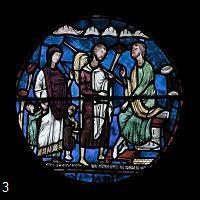 9. Face à la mer, sous la nue, Un homme est là qu'ils saluent: - Passeur, lui dit le monarque, Passez-nous dans votre barque! 10. - La main de la demoiselle, Car la première c'est elle. - La barque est grande, il me semble Que nous n'y tiendrons ensemble. 11. - Sa main! Je l'aide à descendre... Bientôt je reviens vous prendre. - Mais au milieu du passage, Le passeur lui fait outrage. 12. - C'est un roi qu'on déshonore! Dieu, ta protection j'implore! Pareille horrible pensée Jamais ne m'eût effleurée. - 13. Le Ciel entend sa prière: Un grondement de tonnerre, Soudain la foudre est tombée. La barque en deux s'est brisée. 14. Des flots la barque est la proie. Dans l'eau le passeur se noie Et l'autre moitié dérive La reine atteint l'autre rive. 15. - M'avez-vous abandonnée? Des miens je suis séparée: Notre-Dame, Sainte Vierge, Ah, quand-donc les reverrai-je? III 16. La reine de Romanie, Afin de gagner sa vie, Demandait à l'aubergiste: - Des vêtements et le gite! 17. Je veux vous servir dit-elle, Broder, faire des dentelles,... ... ... IV 18. Voyant que l'attente dure, Le roi dans l'eau s'aventure: - Toi, l'aîné, sur mes épaules! Toi, dans mes bras, jeune drôle! 19. Mon cadet, tu dois m'attendre: Je vais revenir te prendre. Mais alors qu'il franchit l'onde, Voilà que son aîné tombe. 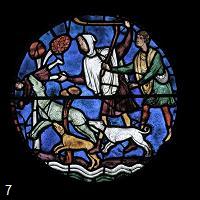 20. Vers le cadet, il s'élance: Mais un lion l'étrangle, immense! Reste le plus jeune encore: Un loup de mer le dévore! 21. Pauvre roi! Fini le rêve! Il est assis sur la grève: - Vierge de Folgoët, Madone, [2] Voici que Dieu m'abandonne! 22. Mes enfants, ma douce amie! Quelle terrible avanie Pour un époux, pour un père! A présent, que vais-je faire? V 23 Le roi que la faim tiraille Sait bien qu'il faudra qu'il aille Pousser la porte du riche Pour quémander une miche. 24. - N'eût été la providence, D'être ici je n'eus la chance. Je travaille, je le jure, Contre gîte et nourriture. 25. Et si votre humeur est telle Je ferai de la dentelle... ... ... 26. Tu ne pleures point? Regarde! Vois ces brebis qu'un roi garde, Du pain moisi pour pitance: C'est celui qu'aux chiens on lance! VI 27. Le berger du roi salue Notre roi de Romanie: - Je cherche un roi. Je demande "L'aurais-tu vu sur la lande?" 28. - Sept ans qu'à cette besogne Je m'emploie sans voir personne. - C'est vous mon roi que je trouve: Ces fleurs de lys me le prouvent. 29. Rendons ses moutons au riche, De son or il n'est point chiche: Ses brebis sont fortunées Qu'un grand monarque a gardées! VII 30. Et le roi de Romanie Entre dans l'hostellerie: - Y a-t-il moyen, l'hôtesse, De loger à cette adresse, 31. Que se chauffe près de l'âtre Un roi qu'accompagne un pâtre? Que les serve la jolie Fille qu'ils ont aperçue? 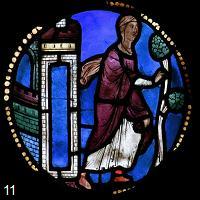 32. Car il n'en est de plus belle. Sauf chez nous: la reine est telle. - [1] - Tout cela je vous l'accorde! Désirs de roi sont des ordres. 33. - Ma fille, soyez aimable Et servez à cette table! Voilà sept ans que j'évite De vous astreindre au service, 34. Mais celui qui vous en prie C'est le roi de Romanie... ...... ...... VIII 35. - Belle, au diable l'avarice, Goûtez ce plat, un délice! - Mais à sa main le monarque Un bel anneau d'or remarque. 36. - Par le salut de mon âme, Seriez-vous ma chère femme? - Oui, celle que vous chérîtes! Mais où sont nos enfants, dites? 37. - Quand nous avançons dans l'onde, De mon dos notre aîné tombe. Vers le second je repasse. En vain: un lion le terrasse. 38. Quand au plus jeune, O détresse! Un loup gris l'a mis en pièces. - Entendant ces mots, la reine S'évanouit. C'est trop de peine. 39. La reine à terre est tombée. Le page l'a relevée, Quand les trois fils, O miracle! Pénètrent dans ce cénacle. 40. - Veuillez me dire, chers anges, Qui donc vous a mis vos langes? - Une blanche demoiselle Nous instruisait avec zèle, 41. La marine créature Démêlait nos chevelures... ... ... IX 42. Ces princes de Romanie Venus vivre en Normandie, Ce sont Saint Loup et Saint Gilles, Et Saint Bernardin, ma fille. [4] à [11] Traduction: Christian Souchon (c) 2013 |
THE KING OF ROMANY First version I 1. There was a king of Romany, Saw a white dove flying fairly; The dove came from heaven above And quoth on behalf of God's love: 2. - Leave your house, King of Romany, And go to stay in Normandy! Give up your realm, quoth the blest wraith, Go to embrace there the true faith! 3. The king of Romany he went To his wife, asking for assent: - Our children I entrust to you. To travel far I say adieu. 4. - Lord, if you leave, with you I'll go. But what about our children, though? - Carry one, I the other two! We will rest when a rest is due! 5. And now let time go by and hours! My dear, just let time take its course! My dear, just let time take its course, Let it gnaw at these lives of ours! - [1] II 6. Both of them walked many a day. They found a chapel on their way. Had entered it to rest at ease, Yet they threw themselves on their knees: 7. Obviously present, they saw, With veneration and with awe, In a gold vase Jesus' body Who baptized all the five godly. 8. So that they were christened that day, But there was no way there to stay. The five again went in God's name, Till to a firth at last they came. 9. The ferryman he was seated On the shore. They duly greeted: - Friend, at a time, you can, I guess, Boat o'er the sea the five of us! 10. - Give me the hand of the lady: I will boat her over firstly. - The boat is not so small that we Could not cross together the sea. 11. - Give me the hand of the lady I shall return to you quickly. - Amidst the sea, beneath contempt, The boatman made a rape attempt. 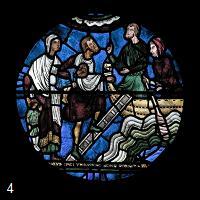 12. - Our Lady, preserve my virtue, For my husband I beseech you, For the man to whom I belong! Never occurred to me such wrong. - 13. Heaven heard her earn'st entreaty: Thunder stroke the boat suddenly. Right suddenly the boat it stroke: The small vessel in two it broke. 14. It shattered it like a nut shell. The boatman in the water fell. The boatman was drowned in water, But the queen she could cross over. 15. - Our Lady of La Trinité, Here I am left, sad and lonely! Husband and children far from me That never again I shall see! III 16. The queen of Romany did say At the guesthouse on that day: - Feed me, allow me here to dwell, Give me clothes and I'll serve you well. 17. I shall work at your inn freely Making lace and embroidery ... ... IV 18. - A long wait is a dreadful thing -. So said to his children the king: - Climb on my back, my eldest son! My youngest, to my arms hold on! 19. My second son, stay here, will you? I'll come back to take you. It's true! But while he was crossing the sound The eldest son fell and was drowned. 20. He hastened to the second son: He was being throttled by a lion! Quick to the youngest he did swim: A sea wolf was devouring him! 21. Poor King! Such awful tale of woe! Sat on the shore, crushed by the blow: - Virgin of Folgoat, your hand stretch! [2] Pity a godforsaken wretch! 22. First my wife and now my three kids! That I should prosper God forbids! Dreadful loss! Happiness, adieu! Woe is me! What am I to do? 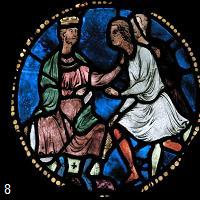 V 23. Now the king of Romany said On ent'ring the rich man's homestead: - I've been three days without eating, For God's sake, please, give me something! 24. But for the mercy of the Lord To walk so far could I afford? Give me food, please, and give me clothes, May I stay? I'll work, same as those 25. Who're employed in your factory: I'll make lace or goldsmithery... ... ... 26. Say, who could refrain from crying, On seeing a sheep guarding sovereign, In his hand a stale piece of bread On which a dog would not have fed? VI 27. Romany's king was, though disguised, By his old shepherd recognized: - Shepherd with your sheep, did you hear Of a king living around here? 28. - I've been a herd for seven years: Such tale never came to my ears. - You are the king I'm looking for: I saw these fleurs-de-lis before. 29. To the rich man return these sheep! He may boast that a king did keep His flock. It is a great deal worth, As he came from across the firth! VII 30. The king of Romany greeted When the hostelry he entered: - Answer me, would you, landlady, Accommodate me fittingly? 31. Would you accommodate a king And his shepherd? Above all things, Could we be served by the girl there Whose beauty is beyond compare? 32. A fairer maid nowhere I've seen Except, perhaps, Romany's Queen. - [1] - Now certainly, please, come right in! A king is welcome in our inn. 33. - My chambermaid, if you love me, A dining waitress you will be. For seven years I've done my best, Shunned making you wait on a guest, 34. And would persist in doing so, But to a king's wish we must bow. ... ... - 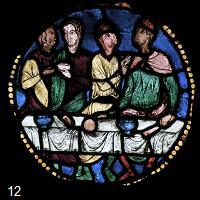 VIII 35. - Come on, young girl, come near my seat! Would you like to taste this meat! - When to the plate she reached her hand He saw her ring, a golden band. 36. - By Our Lady of Trinité, Could you be my wife, really? - And you must be my king, she said. Where are our children? - said the maid. 37. - When we waded across the sound My eldest son fell to the ground. When I came the second to seize: A lion gave his throat a squeeze. 38. As to the third, the truth is grim, A grey wolf was devouring him! - But the king never did speak out: The queen could not withstand the bout. 39. And she swooned at the dreadful news. The pageboy helped her up, confused. What happened in the hall was weird: Their three sons suddenly appeared! 40. - O my dear children, tell me who Changed your blankets and cared for you? - A white maid, from her sea recess, Came daily to look after us. 41. She looked after us, the maid fair, And she untangled our blonde hair... ... ... IX 42. Saint Loup and Saint Gilly the friar As well as Saint Bernardin are Sons to the king of Romany Who came to live in Normandy. [4] to [11] Translation: Christian Souchon (c) 2013 |
(Cliquer sur "+")


